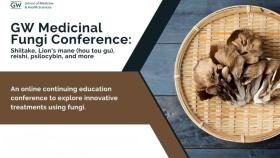
GW Medicinal Fungi Conference - Enduring
There is a growing body of research - both animal and human - supporting the use of fungi, particularly mushrooms, to treat Alzheimer's disease, hypertension, obesity, diabetes, substance abuse disorders, mood disorders, post-traumatic stress disorder, stroke risk, and support the immune system. Due to their anti-tumor properties, they are also being used to reduce the likelihood of cancer invasion and metastasis. In addition to acting as an antibacterial agent, mushrooms have been found to enhance the immune system and lower cholesterol levels.
This enduring educational activity will feature leading researchers presenting talks and discussing the use of fungi for illness and well-being, including new treatments and approaches that will expand research in this field.
Target Audience
Physicians, pharmacists, nurse practitioners, physician assistants
Learning Objectives
After attending this conference, you will:
- Have a better understanding of Psychedelic mushroom therapy;
- Understand how mushrooms are being used for cognitive support for dementia patients;
- Learn about 1,3/1,6-beta-glucan;
- Learn about COVID and mushrooms as immune modulators;
- Have a better understanding of the clinical use of mushrooms in the treatment of cancer.
Program
Plenary Session I: Mental Health
Plenary Session II: Immune modulators
COVID and mushrooms as immune modulators: Gordon Saxe, MD, PhD, MPH, Paul Stamets, DSci (Hon.), (45 min), and Stephen Wilson, PhD
Course Facilitators
Leigh Frame, PhD
Director, Integrative Medicine Programs
Associate Director of the GW Resiliency & Well-being Center
Associate Professor of Clinical Research and Leadership
Associate Professor of Physician Assistant Studies (Secondary)
George Washington University School of Medicine & Health Sciences
Mikhail “Misha” Kogan, MD
Associate Professor of Medicine
Associate Professor of Clinical Research and Leadership (Secondary)
Medical Director of the GW Center for Integrative Medicine
Director, Integrative Medicine Fellowship
Director Associate Director of the Geriatrics Fellowship Program
George Washington University School of Medicine & Health Sciences
Continuing Education Accreditation Information
Physicians
The George Washington University School of Medicine and Health Sciences is accredited by the Accreditation Council for Continuing Medical Education (ACCME) to provide continuing medical education for physicians.
The George Washington University School of Medicine and Health Sciences designates this enduring material for a maximum of 6.50 AMA PRA Category 1 Credit(s)™. Physicians should claim only the credit commensurate with the extent of their participation in the activity.
Pharmacists & Pharmacy Technicians
The George Washington University School of Medicine and Health Sciences is accredited by the Accreditation Council for Pharmacy Education (ACPE) as a provider of continuing pharmacy education.
ACPE#:
ACPE#:
Release Date:
Expiration Date:
CE Credits:
Other Healthcare Professionals
All other healthcare professionals will be provided with a CE certificate and transcript documenting their participation. Credentialing bodies such as the ANCC, AANP, and AAPA accept certificates/transcripts of participation for educational activities certified for AMA PRA Category 1 Credit(s)™ from organizations accredited by the ACCME. You should contact your certifying organization if you are unsure whether an activity will qualify for CE credit.
Available Credit
- 6.50 ACPE PharmacistThe George Washington University School of Medicine and Health Sciences is accredited by the Accreditation Council for Pharmacy Education as a provider of continuing pharmacy education.
- 6.50 AMA PRA Category 1 Credit™The George Washington University School of Medicine and Health Sciences is accredited by the Accreditation Council for Continuing Medical Education (ACCME) to provide continuing medical education for physicians.
- 6.50 Completion

 Facebook
Facebook X
X LinkedIn
LinkedIn Forward
Forward